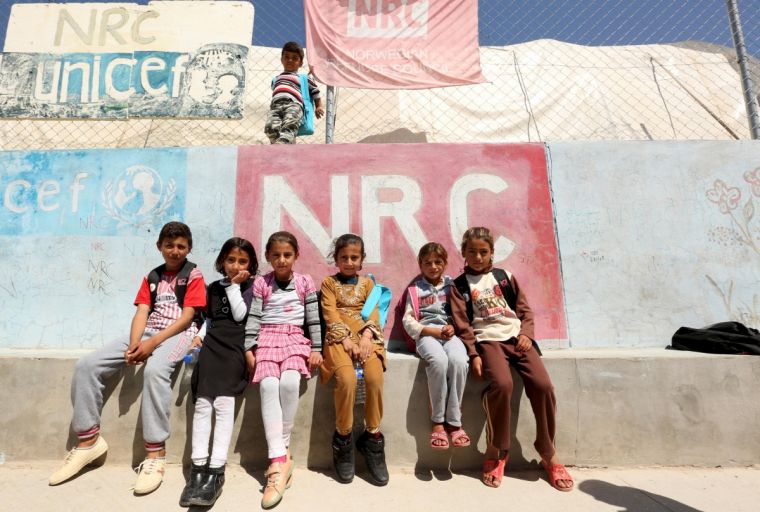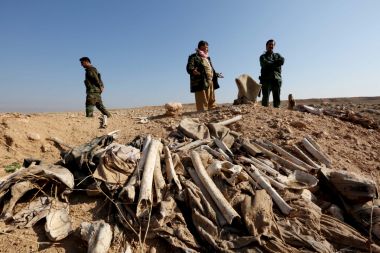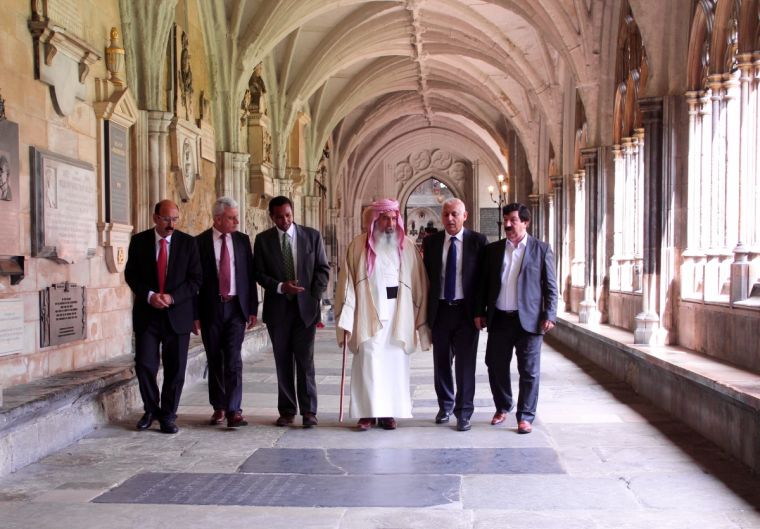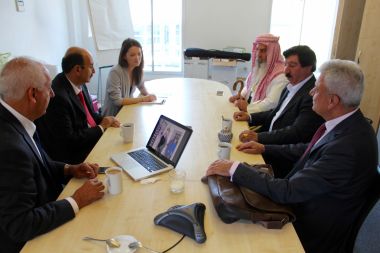Raped, murdered and persecuted by ISIS: The plight of Yazidis in Iraq

Mirza Haj Mirza Qirani, chieftain of one of the Sinjar tribes, remembers the night Islamic State invaded on August 3, 2014. At about 2:20am, he received word that the jihadists had advanced and were attacking his village. Men immediately went out to fight, but had only light weapons – they were almost defenceless against ISIS' sophisticated weaponry. The battle continued for about five hours, when it became apparent that the only option was to flee. Militants captured and slaughtered around 350 of the villagers, while the rest – Qirani among them – were able to escape. He recalls the tens of thousands of people he saw on foot on their way to Sinjar mountain. The elderly, the disabled and children struggling to keep up, but having no choice but to push on.
Qirani was part of the most senior delegation of Yazidi religious leaders ever to visit the UK last week. Speaking at the Amar Foundation offices in Westminster, they told Christian Today that it's time for the world to wake up to the plight of their people.
Qirani's story is one of hundreds of thousands of similar testimonies. Harrowing scenes unfolded in Northern Iraq two years ago; as Sinjar town and its surrounding villages were overrun, hundreds of civilians were slaughtered and more than 400,000 forced to flee. Some 5,000 were taken captive, 3,000 of whom remain hostage, and disturbing accounts of their treatment at the hands of militants have emerged from those who have since been smuggled out or managed to escape. Women and children have been brutally raped and abused; bartered and sold among jihadists for as little as a packet of cigarettes. Men were rounded up and killed. Mass graves have been found, as well as underground dungeons where women were kept as sex slaves.

In the weeks following the insurgency, the world watched in horror as 40,000 members of religious minority groups were stranded on the Sinjar mountainside without food, water or sanitation. Some were Christians and Shia Muslims, but the majority were followers of Yazidism – an offshoot of Zoroastrianism, which blends ancient religious traditions with both Christianity and Islam. Yazidis, native to the northern Mesopotamian region where they have worshipped for millennia, have been targeted relentlessly by ISIS, who consider them to be "devil-worshippers".
Food and water drops were made by international agencies, but at least 300 people, most of them children, perished in the blistering temperatures. And two years on, the Yazidi community remains vulnerable to ISIS' advance. There were once more than 600,000 Yazidis in Northern Iraq, but there are now believed to be fewer than half that number. Thousands have been killed, and many more are forced to live hand-to-mouth in Iraqi refugee camps, or have fled further afield to Europe.
The European Parliament and the US administration has declared ISIS' atrocities against Yazidis, Christians and other religious minorities in the Middle East to be genocide. The UK has failed to follow suit, though MPs voted unanimously in favour of the label in the House of Commons last month. Prime Minister David Cameron has said he hopes that the word 'genocide' will be used, but maintains that it is a matter for the International Criminal Court.
This isn't the first time the Yazidi community has been persecuted – staggeringly, they say this is the 74th time they have been the target of genocide. But despite a troubled history, none believed they could suffer to the extent they have under ISIS.
"We are a peaceful religion. We have no intention to take power, and we would prefer to be killed than converted," Qirani said, speaking through an interpreter. "The attack by ISIS was unexpected, unpredictable, and we thought that if such a thing would happen, there are foreign forces – the United States and the UK – who would intervene directly and stop such atrocities. But they came too late."

The delegation insisted they were thankful for the eventual intervention of Western forces, however. Without the US-led coalition air strikes, they said, the entire Yazidi and Christian community in Iraq may have been wiped out. But they called for stronger action: "We thank God that finally the air strikes came. Not only for Yazidis, but for Christians the same. Their [ISIS'] plan was to eliminate all minorities. It's time for this evil to be eliminated and stopped in its place."

Revenge, though, remarkably isn't on their radar. In the aftermath of the Sinjar massacre, there were some reports of Yazidis extracting revenge on local Arab villages, but the senior religious leaders insisted that reconciliation is the only way forward for Iraq.
"We must learn from each other how to forgive, and remove the darkness which is prevailing on this earth," Farooq Khalil Basheer, a member of the Yazidian religious council, said. "We must accept each other, and forgive, like brothers. That's the most important thing – how to live peacefully with each other."
There was some discussion, and disagreement, about whether this was possible, given the scale of the atrocities against Yazidis, Christians and others. "This is our dream, but it's not possible. Not possible," Jameel Sulaiman Haider, an advisor to the religious council, said.
"God is there to punish the evil deeds of human beings," Basheer added, but he emphasised the importance of forgiveness. Without it, he suggested, there is no hope for Iraq's future.
Part of the reason the delegation were in London, supported by the Amar Foundation, was because the Yazidi leaders want to urge the international community to create a "marshal plan" for when ISIS is eventually defeated. The council has already begun to make changes in its own community. Reports surfaced last year that claimed women and girls taken captive and used as sex slaves by ISIS militants were having secret abortions and vaginal surgery to avoid being ostracised by their own communities when they escaped and returned home. Yazidi leaders therefore issued an official law which said women who had been raped and abused by ISIS must be welcomed back without fear of discrimination.
"They were raped, enslaved, assauted. Why should we treat them like them [ISIS]?" Basheer said.
"They are members of our community and we respect them... nobody is an outsider."
"We want the UK to acknowledge these attacks as genocide against the Yazidis, but [also] to move beyond that border," added Dr Mamou Othman, a former Iraqi minister and now director of the European Studies Centre at the University of Dohuk. "When ISIS is defeated, and Iraq is liberated, how do we let people go back? And more than that, how to give them a feeling of security that they can continue living there. We don't want our people to leave the country."
The delegation were adamant that it be made possible for Yazidis, Christians and other religious minorities in the Middle East to live there in peace without fear of persecution. Yazidism, Basheer explained, holds connection with the land highly. It is therefore vital that Yazidis remain living in their Mesopotamian homeland. "We are hoping that the UK government will be involved more and try to do more for the indigenous of Mesopotamia to let them continue their lives and practise their festivals, their rituals, their religions, because we are connected with the land," Basheer said.
"Our shrines are there, our festivals, our rights and rituals, everything... If we go abroad, we are afraid they will be lost.
"It's just like a tree without roots, it will die."
The religious council were in the UK supported by the AMAR International Charitable Foundation. For more information on their latest appeal on behalf of persecuted communitues in Iraq, click here.











